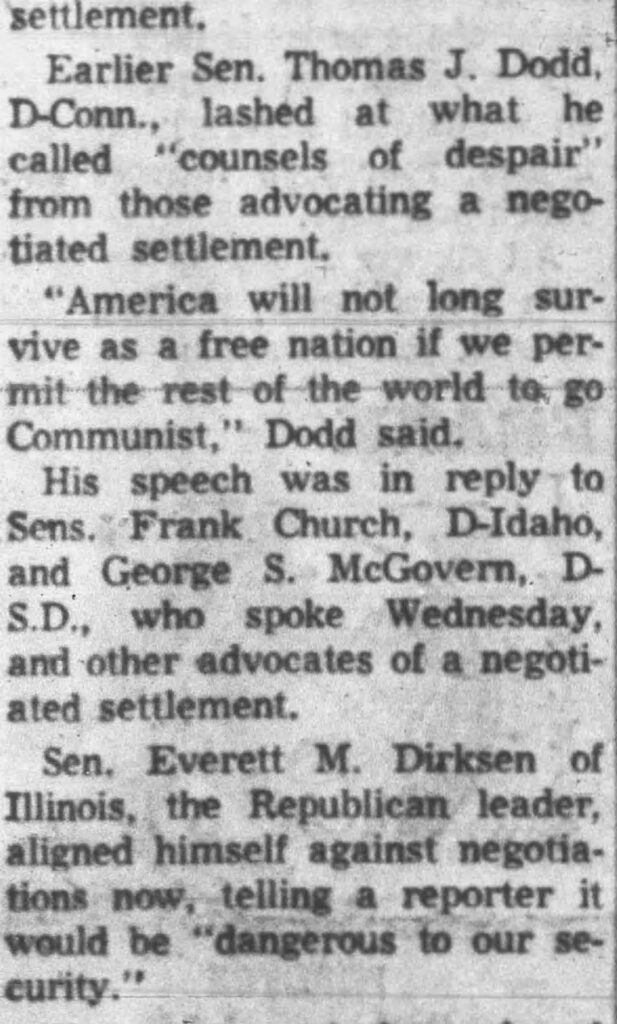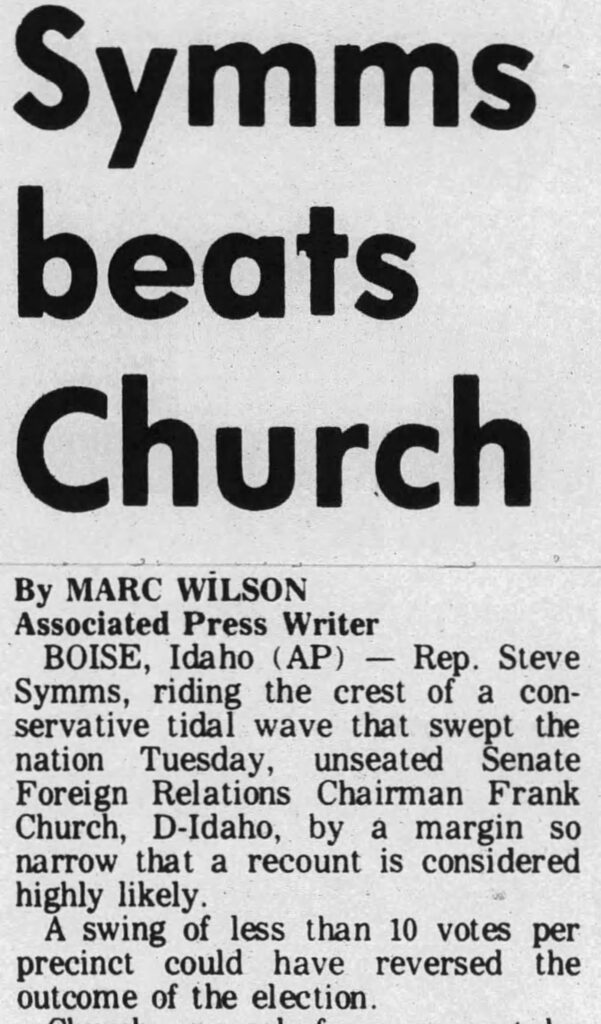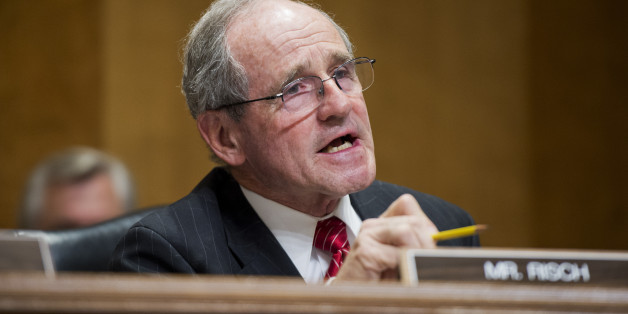On Feb. 17, 1965, Frank Church, a 41-year-old United States senator from Idaho, became one of the first senators to openly question U.S. policy in Vietnam. On that same day, George McGovern, a 42-year-old senator from South Dakota, expressed similar reservations. The Senate speeches were reported, among other places, on the front page of the New York Times under a headline “Johnson Asserts U.S. Will Persist in Vietnam Policy.”

In their Senate speeches, Church and McGovern warned against the administration of President Lyndon Johnson becoming involved in what each correctly viewed as a post-colonial war of national liberation. Vietnam was, in fact, of little strategic importance to the United States. As the war intensified over the next 10 years, criticism of Church and McGovern increased, even as others joined their critique of what famed journalist David Halberstam pronounced at the time “a quagmire.”
The Senate action by Church and McGovern, Democrats from traditionally Republican states, marked the beginning of what became a sustained debate in Congress of Vietnam policy. That debate ultimately spilled over to street protests in many cities and on the campuses of its colleges. Pursuing the war would eventually claim more than 58,000 Americans and as many as 2 million Vietnamese.
Sixty years later, the historical consensus holds that Church and McGovern were right about both the war and Vietnam’s lack of strategic importance to the United States. Yet, political prescience aside, and measured against the fraught and divided politics of the country today, what remains fundamentally important about the stands made by the two was their principled criticism of the policy of a president of their own party.
Privately and with selective leaks to reporters, Johnson berated both senators for their stand. “But Frank Church spoke out,” as the Washington Post noted in Church’s obituary in 1984, “even as joking staffers wondered when President Johnson would send the Army Corps of Engineers to begin dismantling Idaho’s dams.”
Johnson viewed the young Idaho senator as a protégé and had engineered Church’s appointment to the Foreign Relations Committee, a plum assignment then that has become less plummy in our time. Johnson used the celebrated “Johnson treatment” on both the senator and his wife, Bethine, flattering, cajoling, praising, threatening, while always angling for public support.
When Johnson campaigned in Boise in 1964, he laid it on particularly thick, calling Church, “your eloquent and able young senator and his charming wife who helps Frank do such a good job.”
“I have always agreed with the people of Idaho on your choice of Churches,” Johnson said. “There is no senator that Washington respects more, and none that the nation needs more, and none that your president values more, than Frank Church.”
Yet, weeks later Church was pointing out the flaws in Johnson’s Vietnam policy and suffering for doing so. As his dissent became more intense, Vietnam became a central issue in Church’s reelection in 1968. His Republican challenger, Congressman George V. Hansen, slashed Church for being a “dove” providing “aid and comfort” to Communists.

Church biographers LeRoy Ashby and Rod Gramer detail the almost slapstick story of a St. Maries dogcatcher, Gene Mileck, who led a recall campaign against Church. Mileck’s efforts were supported by the John Birch Society, the far right of the Idaho Republican Party and wealthy out-of-state millionaires, in large part because of Church’s stand on the war. The recall effort was clearly unconstitutional and eventually collapsed, but the constant attacks on Church took a political toll, even as he proved he could fight back. Using language that might well resonate with some in Idaho today, Church said, “I think the people of Idaho have too much sense to allow this state to be taken over politically and economically by carpetbaggers from California.”
Church would go on to win four terms in the Senate — he defeated Hansen in 1968, winning 60% of the vote — becoming a leading advocate for a foreign policy based not on military intervention in the world’s revolutions but squarely focused on the nation’s vital interests. Church’s historic investigation into the abuses of the nation’s intelligence agencies remains his enduring legacy. Late in his last term, Church assumed the chairpersonship of the Foreign Relations Committee, a lifelong ambition.
Today, the United States faces a foreign policy challenge as existential as Vietnam proved to be in the 1960s: How does the country confront the ambitions of a brutal Russian dictator who aims to recreate much of the former Soviet empire and end American leadership of the most successful military alliance in the history of the world?
While the circumstances of America’s role in Vietnam and its posture in Ukraine are vastly different, the role of the United States Senate in helping shape American policy — or at least demanding debate of foreign policy issues — has all but disappeared. And today, another Idahoan helms the Foreign Relations Committee, a position that — would Sen. James Risch use it — could help define and shape U.S. policy in central Europe and elsewhere.
Risch has been silent as the Trump administration has demanded concessions from Ukraine while browbeating Ukrainian President Volodymyr Zelenskyy. While Trump wages a tariff war against Canada and threatens Canadian sovereignty, the leader of the Foreign Relations Committee says nothing. Threats to NATO, senseless posturing on Greenland or Panama, nothing prompts the least bit of pushback from Risch.
Risch, who seemed steadfast in support of Ukraine before Trump’s return, might use his position to conduct hearings on U.S. policy, drawing on the expertise and experience of diplomats and military leaders, much as then-Foreign Relations Committee Chairman J. William Fulbright did in the 1960s or Church did in the 1970s.
Instead of hearings or speeches or even an interview with a reporter, Risch actually blocked a Senate resolution last week that condemned Russian action and demanded an immediate end to the war. In doing so the Idaho senator’s particular brand of arrogance was on full display, lecturing Sen. Bernie Sanders – the sponsor of the resolution – that he didn’t know what he was talking, while make the preposterous claim that the only person “on the planet” who can end the war in Ukraine is “Donald J. Trump.”
Watch the video of the exchange, but you might consider doing it on an empty stomach.
The senator’s posture is a case study of the dreadful decline of influence of the U.S. Senate as an essential institution shaping the nation’s foreign policy. When Idaho and the nation requires a Church, it has a Risch. History will remember one for independence and another for carrying the briefcase of a president apparently determined to hand Vladimir Putin the first of what is likely to prove to be many victories in the heart of Europe, while frightening and alienating allies that have been with America for decades.
It would be sad if it were not so dangerous.
—–0—–
Additional reading:
Two more items for your consideration …
One Word of Truth Shall Outweigh the Whole World
The Russian author’s Nobel Prize lecture contains an urgent message for contemporary audiences.
“The world is being inundated by the brazen conviction that power can do anything, justice nothing,” the man who had spent nearly a decade in the labor camps of the Gulag told a complacent world. “The price of cowardice will only be evil; we shall reap courage and victory only when we dare to make sacrifices.”
A Town Without Time by Gay Talese review – New York by an old master
I recently read Talese’s amazing book about The New York Times. Can’t wait to read this.
“It’s a wonderful nonfiction rendering of New York – in fact, a piece of New Journalism to relish at a time when the fourth estate increasingly seems to favour No Journalism instead.”
From The Guardian.
Do what you can. Do all you can. See you soon.












